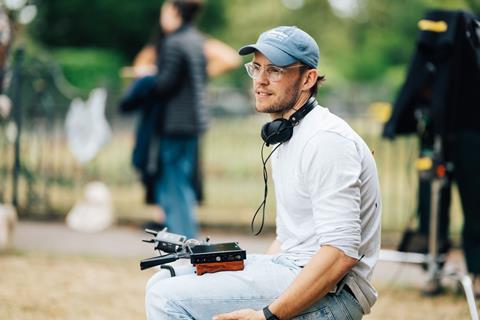
Harry Lighton’s Pillion, which premieres in Un Certain Regard on Sunday (May 18), may be termed a queer drama whose time has come.
Freely adapted from Adam Mars-Jones’ 2020 novella Box Hill, and set in the outer-London suburb of Bromley, the film depicts an at-times tender relationship between a submissive traffic warden (Harry Melling) and the dominant leader of a gay motorcycling club (Alexander Skarsgard). It’s a transgressive story that first-time feature director Lighton acknowledges would have been harder to make in a recent past when there was more pressure “to tell a very positivist gay relationship that serves your community”.
“If I felt like I was setting a precedent for gay romances with the story, then I would have been wary about telling this one,” explains Lighton, whose shorts include 2017’s Bafta- and Bifa-nominated Wren Boys. “I like knotty stories, and I was intrigued by the possibility of telling a relationship which was in some ways rose-tinted, but in some ways very much the opposite.”
Melling stars as mild-mannered Colin, who at the start of Pillion lives with his loving and accepting parents (Douglas Hodge, Lesley Sharp), and cannot believe his luck to have attracted interest from the tall, charismatic, mysterious Ray (Skarsgard). Blessed with what Ray identifies as “a capacity for devotion”, Colin quickly moves in with his sub-dom mentor, also becoming his pillion rider. He assumes responsibility for domestic chores, leaving the dominant partner more time to lounge around, decoratively reading Karl Ove Knausgard’s autobiographical novel series, My Struggle.
Lighton had been developing Stable, a film set in the world of Japanese sumo wrestling, with BBC Film and Element Pictures when the Covid pandemic put that project on hold. Then, BBC Film director Eva Yates sent him Box Hill – a text the filmmaker found “equal parts funny and moving and bracing”.
The development was set up quickly, with producer Emma Norton leading for Element. Initial treatments saw Lighton take wild swings at the story world – for example, transposing the action to a cruise ship – before settling much closer to the source. But he nevertheless made key changes, which included abandoning Mars-Jones’ 1970s/’80s setting, compressing the story into a single year and making the two men closer in age.

Men for the job
Pillion needed to attract a pair of actors willing to take on transgressive material, and also able to attract the right level of financing.
Lighton had admired Melling in films such as Joel and Ethan Coen’s The Ballad Of Buster Scruggs and Antonio Campos’s The Devil All The Time: “He had this interesting combination of charisma and a sort of beta male [energy]. He’s totally magnetic on screen, but not in a typical leading man way.
“Colin is a character who is definitionally passive, and so having someone who manages to keep you glued to them while they’re seemingly being a loser, he was the man for the job.”
For Ray, the filmmaker took note of Skarsgard’s performance as a tech billionaire in Succession.
“He’s your archetypal six-foot-four handsome man, but the way in which he asserted his status over the Roy family, it was all about unsettling them, he’s very mischievous and playful. I wanted someone as Ray who had the surface of your porn-mag biker, but had a lot beneath that.”
With the leads in place, BFI boarded the film; the UK’s Picturehouse Entertainment and Benelux’s September Film came in not just for territory buys but equity financing (and have executive producer credits respectively for Clare Binns and Pim Hermeling); and Element majority stakeholder Fremantle provided the final piece of the puzzle. Cornerstone Films came on as sales agent, and A24 pre-bought North American rights.
“Taking the project out to market, we thought we had this Marmite screenplay that people are going to love or hate, but actually the majority of people loved it,” recalls Norton. “And then we were like, ‘Oh, we’ve created something very sweet,’ we hadn’t quite realised.”
For the five-week summer 2024 shoot on location in and around Bromley, Element brought on producer Lee Groombridge (Andrea Arnold’s Bird) to lead on the physical producing side; Element’s Ed Guiney and Andrew Lowe also produce.
Finding the tone
A key aspect was always going to be the depiction of sex and intimacy. “There were lots of discussions about how to achieve the kind of sex that I wanted to put on screen in a way that didn’t feel like empty provocation,” explains Lighton. “My position was always that, in a film about transgressive sex, to shy away from representing that sex seemed to me like casting a judgement on it, and I always wanted to leave the judgement in the audience’s hands.”
The director had conversations with his actors at the casting stage, agreeing limits, while intimacy coordinator Robbie Taylor-Hunt joined for the shoot. For roles in Ray’s biker club, Lighton turned to the UK’s Gay Bikers Motorcycle Club, which had already provided help at the research stage, giving Lighton his own pillion experiences.
“I wanted to cast people who didn’t feel like they were playing dress-up in these parts,” says the filmmaker, who adds that a number of the club members are coming to Cannes for the premiere.
That premiere occurs three days before another LGBT+ drama from a UK-based director: Oliver Hermanus’ Competition entry The History Of Sound. The two filmmakers are professionally connected – Lighton served as director’s assistant on Hermanus’ feature Living; directed second unit on his Sky/Starz series Mary & George; and wrote the screenplay for his upcoming biopic of fashion designer Alexander McQueen.
“I didn’t go to film school, so I’d learned about directing from making shorts,” says Lighton. “On Living, I quickly realised that I had no knowledge of how a set was meant to be run. I remember feeling very overwhelmed on that first day. The thing I’d recommend to any person who’s going to make a feature is to go do that on someone’s film, because it was invaluable.”
Lighton finished delivery on Pillion mere days before Cannes, and has not yet pinpointed his next feature. But he’s confident it will be with Element again. “I’m reading books and have an idea of my own about hair transplants,” he says. “Hopefully, Element will pay for me to go to Turkey on an all-expenses-paid development trip.”















![[L-R]: Amanda Villavieja, Laia Casanovas, Yasmina Praderas](https://d1nslcd7m2225b.cloudfront.net/Pictures/274x183/6/4/1/1471641_pxl_20251224_103354743_618426_crop.jpg)








![[L-R]: Amanda Villavieja, Laia Casanovas, Yasmina Praderas](https://d1nslcd7m2225b.cloudfront.net/Pictures/100x67/6/4/1/1471641_pxl_20251224_103354743_618426_crop.jpg)
No comments yet